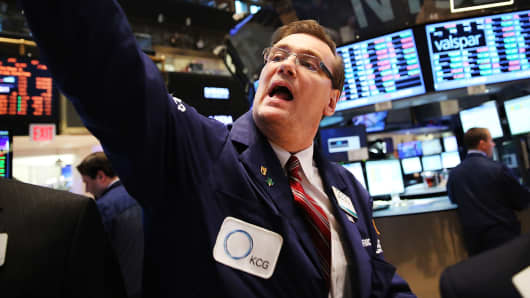US Markets
U.S. stocks tumbled on Thursday, with the Dow falling back
below 17,000, as investors fled equities and other risky assets after
the crash of a passenger plane in Ukraine and as Israel launched a
ground offensive in Gaza.
The crash of a Malaysia Airlines Boeing 777 with 295 people aboard near the Russian border followed new U.S. and European Union sanctions on Russia.
Stocks lost more ground in the "last half hour on whatever new information is out on the Ukraine plane situation, plus the Israeli ground invasion on the strip has started," said Stephen Carl, head equity trader at the Williams Capital Group.
In Israel, Prime Minster Benjamin Netanyahu said he had instructed the nation's military to begin a ground offensive in Gaza.
"The airliner news only adds to the drama around an unsettled market environment for those watching geopolitical events, not only Ukraine, but Israel and Iraq," said Jim Russell, senior equity strategist for US Bank Wealth Management.
After wavering near unchanged, stock indexes turned decisively lower after the reports involving Malaysia Airlines Flight 17. The price of gold and crude surged and Treasury yields fell.
Read MoreMarket reaction to Malaysia jet crash could be short-lived
"Everybody is scrambling to figure out what the details are, and until some of that gets resolved, we'll be in limbo. The concerns about global growth are being replaced by the geopolitical piece," said Jim Dunigan, managing executive, investments, PNC Wealth Management.
"It's certainly a less-than-stable environment when you look outside our borders; inside it remains very positive. But we're not insulated from all the spots where tension is flaring up, so it distracts from the normal attention on earnings," Dunigan added.
The Chicago Board Options Exchange Volatility Index, a measure of investor uncertainty, rose 35 percent to 14.85, its highest in more than a year.
"Everything was going fine until we had news of a Malaysian plane crash near the Russian border," said Art Hogan, chief market strategist at Wunderlich Securities.
Mayalysia Airlines said it had lost contact with the MH17, while the Associated Press quoted a Ukraine government minister as saying a plane had been shot down.
Microsoft shares rose after the software giant said it would cut 18,000 jobs in the next year. Morgan Stanley turned lower after the brokerage reported quarterly results, and UnitedHealth Group gained after its earnings beat estimates.
Read MoreMicrosoft plans to slash jobs
The crash of a Malaysia Airlines Boeing 777 with 295 people aboard near the Russian border followed new U.S. and European Union sanctions on Russia.
Stocks lost more ground in the "last half hour on whatever new information is out on the Ukraine plane situation, plus the Israeli ground invasion on the strip has started," said Stephen Carl, head equity trader at the Williams Capital Group.
In Israel, Prime Minster Benjamin Netanyahu said he had instructed the nation's military to begin a ground offensive in Gaza.
"The airliner news only adds to the drama around an unsettled market environment for those watching geopolitical events, not only Ukraine, but Israel and Iraq," said Jim Russell, senior equity strategist for US Bank Wealth Management.
After wavering near unchanged, stock indexes turned decisively lower after the reports involving Malaysia Airlines Flight 17. The price of gold and crude surged and Treasury yields fell.
Read MoreMarket reaction to Malaysia jet crash could be short-lived
"Everybody is scrambling to figure out what the details are, and until some of that gets resolved, we'll be in limbo. The concerns about global growth are being replaced by the geopolitical piece," said Jim Dunigan, managing executive, investments, PNC Wealth Management.
"It's certainly a less-than-stable environment when you look outside our borders; inside it remains very positive. But we're not insulated from all the spots where tension is flaring up, so it distracts from the normal attention on earnings," Dunigan added.
The Chicago Board Options Exchange Volatility Index, a measure of investor uncertainty, rose 35 percent to 14.85, its highest in more than a year.
"Everything was going fine until we had news of a Malaysian plane crash near the Russian border," said Art Hogan, chief market strategist at Wunderlich Securities.
Mayalysia Airlines said it had lost contact with the MH17, while the Associated Press quoted a Ukraine government minister as saying a plane had been shot down.
Microsoft shares rose after the software giant said it would cut 18,000 jobs in the next year. Morgan Stanley turned lower after the brokerage reported quarterly results, and UnitedHealth Group gained after its earnings beat estimates.
Read MoreMicrosoft plans to slash jobs
The Dow Jones Industrial Average fell 161.26 points, or 0.9 percent, to 16,976.94, with Intel leading blue-chip losses that extended to 27 of 30 components. It had risen 13 points to an intraday record of 17,151.56.
The S&P 500 fell 23.44 points, or 1.2 percent, to 1,958.13, with energy losing the most among its 10 sectors, all of which declined.
The Nasdaq lost 62.52 points, or 1.4 percent, to 4,363.45.
For every share rising, four fell on the New York Stock Exchange, where 694 million shares traded. Composite volume cleared 3.3 billion.
Gold futures jumped $16.70, or 1.4 percent, to $1,316.15 an ounce; the yield on the benchmark Treasury note fell 5 basis points to 2.471 percent.
The dollar declined and crude-oil futures rose $1.78, or 1.7 percent, to $102.98 a barrel.
Equities began the session in the red after the United
States and European Union imposed sanctions on Russian banks, energy
companies and defense companies in another try at getting Russia to stop
its backing of Ukrainian rebels.
Russia sanctions hit stocks; escalation eyed
Economic reports offered differing messages on the housing and labor markets, with housing starts unexpectedly falling in June, applications for jobless benefits declining last week and a gauge of manufacturing activity in the Philadelphia region expanding in July.
"The market is ready for a pullback, if it could find an excuse. The problem is the data are not providing it," said David Kelly, chief market strategist at J.P. Morgan Funds, speaking ahead of the reports involving the Malaysian passenger plane.
"The market is in its 33rd month without a 10 percent or more correction; everybody is scratching their heads and looking for a correction that hasn't occurred," offered Russell.
Mix-match: U.S. claims and housing starts decline
On Wednesday, U.S. stocks rose, again lifting the Dow into uncharted terrain, with investor sentiment boosted by corporate earnings and deals.
Read MoreIntel leads Dow to 15th record-high close of the year
Russia sanctions hit stocks; escalation eyed
Economic reports offered differing messages on the housing and labor markets, with housing starts unexpectedly falling in June, applications for jobless benefits declining last week and a gauge of manufacturing activity in the Philadelphia region expanding in July.
"The market is ready for a pullback, if it could find an excuse. The problem is the data are not providing it," said David Kelly, chief market strategist at J.P. Morgan Funds, speaking ahead of the reports involving the Malaysian passenger plane.
"The market is in its 33rd month without a 10 percent or more correction; everybody is scratching their heads and looking for a correction that hasn't occurred," offered Russell.
Mix-match: U.S. claims and housing starts decline
On Wednesday, U.S. stocks rose, again lifting the Dow into uncharted terrain, with investor sentiment boosted by corporate earnings and deals.
Read MoreIntel leads Dow to 15th record-high close of the year
—By CNBC's Kate Gibson















0 σχόλια:
Δημοσίευση σχολίου
Ο σχολιασμός επιτρέπεται μόνο σε εγγεγραμμένους χρήστες